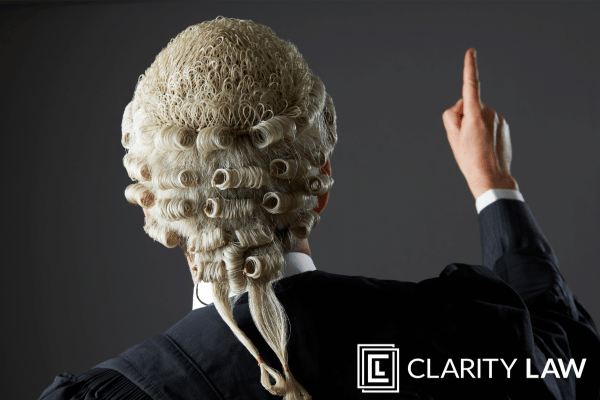
The lawyers at Clarity Law are traditionally called solicitors. Clarity Law sometimes hires barristers to assist our clients.
What is the difference between a solicitor and a barrister, and why might you need one?
The Short History of Barristers
The profession of barristers, often referred to as advocates or counsel, boasts a rich and storied history dating back to ancient Rome. The origins of barristers can be traced to the Roman legal system, where specialized legal representatives known as "orators" were entrusted with presenting cases in the forum. This early incarnation laid the groundwork for the development of barristers in later legal systems.
The modern concept of barristers as distinct legal professionals emerged in England during the late Middle Ages. By the 16th century, the legal profession had become divided into two distinct groups: solicitors, who handled legal matters outside of court, and barristers, who were trained to argue cases before the courts.
In Australia, the tradition of barristers was inherited from England, and it was further shaped by the evolving legal landscape of the 19th and 20th centuries. The establishment of the Queensland Bar Association in the late 19th century marked a significant milestone in the formalization of the barrister profession in Queensland. Since then, barristers have played a vital role in the legal system, providing specialised advocacy, legal expertise, and representation in courts of law.
Why do Barristers wear Robes and a Wig?
Barristers wear robes and wigs as part of a traditional legal dress code that has its roots in English legal history. Here are the main reasons for this practice:
-
Historical Tradition: The tradition of wearing robes and wigs dates back several centuries to the 17th century in England. At that time, it was customary for members of the upper classes to wear formal attire when appearing in public, and this practice extended to the legal profession.
-
Symbol of Impartiality: The uniformity of robes and wigs is intended to create a sense of neutrality and impartiality. By concealing personal clothing and hairstyles, it emphasizes that the focus should be on the law and the proceedings, rather than the individual barrister.
-
Professionalism and Dignity: The attire is seen as a sign of professionalism and respect for the legal process. It sets a formal tone for court proceedings, underscoring the seriousness and importance of the matters being discussed.
-
Equality in Appearance: Robes and wigs serve to diminish distinctions in appearance between barristers. This is important in conveying the idea that all barristers are equal before the law, regardless of their personal background or status.
-
Historical Continuity: By adhering to these longstanding traditions, the legal profession pays homage to its historical roots and demonstrates continuity in the practice of law.
-
Identification of Role: The attire helps to distinguish barristers from other participants in the legal process, such as solicitors, judges, and court staff. This clear visual distinction aids in the smooth functioning of court proceedings.
-
Courtroom Decorum: The formality of the attire contributes to the overall decorum of the courtroom, reinforcing the gravity of the proceedings and creating a structured environment.
It's worth noting that while this tradition is still observed in some jurisdictions, it has evolved or been abolished in others. In Queensland the wearing of wigs and robes has been reduced with a greater emphasis on practical and comfortable courtroom attire. In most cases robes and wigs are only worn in the District or Supreme Court involviong criminal matters.
What’s the Difference Between a Barrister and a Solicitor?
The main difference between a barrister and solicitor is a barrister specialises in ‘higher’ court work, and he or she will tend to have less contact with a client, tending to have the client’s instructions conveyed to him through the solicitor. A barrister is a sole trader. Clients will generally not go directly to a barrister, but rather, solicitors approach the barrister to give him work. He is required to accept that brief and perform all work expected under the retainer.
Queensland has a court hierarchy. The highest court in the state is the Supreme Court, followed by the District Court, followed by the Magistrates Court. Barristers will tend to work in the Supreme Court and the District Court. Barristers will often be called upon to do anything more complicated than an adjournment in those courts, which can include trials, pre-trial applications, and sentences. Because barristers appear in those higher courts often, they will be well armed with knowledge of the different judges in those courts, as well as the most up-to-date case law relevant to the charges litigated in those courts.
A solicitor, on the other hand, will be the primary contact for the client. It will often be a solicitor who does the paperwork and who organises the preparation of documents such as character references, personal statements, and psychological reports. The solicitor will be the primary point of contact for the various agencies (prosecution, community corrections, the courts etc). Solicitors will tend to do most kinds of work in the Magistrates Court. More experienced solicitors may appear in the District Court and Supreme Court. Solicitors will be involved in the case from the start, whereas barristers only come into the picture later. In more complicated court proceedings, both the barrister and solicitor will appear in the court, but the barrister will speak to the judge or jury directly while the solicitor ‘instructs’ in a supporting role.
Why Would I Need a Barrister?
Mostly it comes down to expertise and experience. While we at Clarity Law have the skills and experience needed to do some things in the higher courts, we are just never going to have the same level of experience in those higher courts as a barrister. This is because the vast bulk of our work is concentrated in the Magistrates Court, whereas a barrister is almost always in the higher courts. Barristers are particularly helpful for complicated processes. For example, a trial by judge and jury is a complex and time-intensive undertaking. Barristers are trained and experienced in the rules of evidence, questioning witnesses, and preparing speeches for a jury. A solicitor will often lack this training and experience, or, if the solicitor has it, it will be basic compared to that of a barrister.
Another upside of retaining a barrister is there will be two heads working on a case instead of one.
How is a Barrister Chosen?
Speaking for myself, I have a pool of trusted barristers from which I recommend. The barrister I recommend to a client will depend on a few factors such as the barrister’s proven record with certain types of charges, the personality of the barrister and how well that might fit with the client, and how available a given barrister might be for the work I would need him to do. Choosing the right barrister will depend on the circumstances of the case and the needs and personality of the client. The client need not take my recommendation, but usually does.
Conclusion
Most of the time a barrister will come recommended for more complicated court procedures, especially those in the District and Supreme Courts. As always, whether a barrister is needed will be dependent on the specific circumstances of the client’s case. Suffice it to say, should a barrister be required, Clarity Law will choose a barrister we think best fits the requirements of the case and the client.
How do I get more information or engage you to act for me?
If you want to engage us or just need further information or advice then you can either;
-
Use our contact form and we will contact you by email or phone at a time that suits you
-
Call us on 1300 952 255 seven days a week, 7am to 7pm
-
Click here to select a time for us to have a free 15 minute telephone conference with you
-
Email This email address is being protected from spambots. You need JavaScript enabled to view it.
-
Send us a message on Facebook Messenger
-
Click the help button at the bottom right and leave us a message
We are a no pressure law firm, we are happy to provide free initial information to assist you. If you want to engage us then great, we will give you a fixed price for our services so you will know with certainty what we will cost. All the money goes into a trust account monitored by the Queensland Law Society and cannot be taken out without your permission.
If you don’t engage us that fine too, at least you will have more information on the charge and its consequences.






